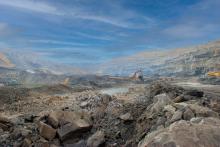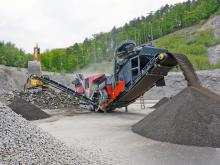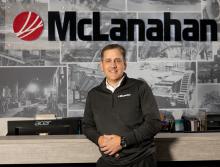
You can have the best crushers and screeners in the world, but you won’t get far in the highly competitive global market if you can't sell or rent them. This makes the role of the original equipment manufacturer (OEM) dealer and the work of each member of its team vital.
At the Powerscreen World Dealer Conference, Owen Smyth, Powerscreen’s North American sales director, and Philip Wilson, Powerscreen regional sales manager, were joined on stage by Stephen Watterson and Darren ‘Barney’ Smith from Lincom Group (Australia); Sean McGeary from Blue Group (UK); Cathal Sheelan of Powerscreen New England (USA); Peter Voolstra from Van der Spek (Netherlands); Alan Coalter and Aaron Fox, of Powerscreen Crushing & Screening (Louisville, Kentucky, USA); and Ian Williamson from Powerscreen Mid Atlantic (North & South Carolina, Virginia and West Virginia, USA).
To kick off the panel discussion, Smyth asks how someone is brought into a Powerscreen dealership and trained up. “We put our newbies in the machine workshop first to learn what the machines do, and we’d keep them there for six months, then have them do the following six months on the road with the plant-servicing teams. After that, we would put them in the dealer office close to our machine workshop and see if they are doing things right and train them on the job,” says Coalter, president of Powerscreen Crushing & Screening. “If you hire a salesperson, you have to be prepared that they might not make you any money for 18 months to two years.”
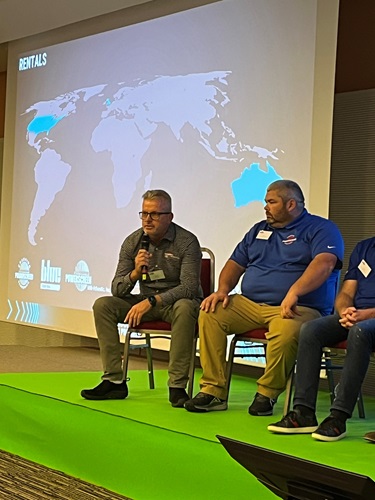
Watterson, director of Lincom Group, adds: “Most of our sales team have come up through the ranks as service engineers. They started in the workshop and, over time, morphed into service engineers, spending four or more years on the road fixing machines. They build a rapport with the customer and know the machines and the areas they are working in; they are on the path to being a salesman.”
“We've got sales guys who used to be on the tools and are very technically competent,” says McGeary. “Sales guys that lack a bit of technical competency make up for it with charisma that helps them tremendously in their role. All our guys have been with us for a long time. We don't have a high turnover of sales staff. You look after them as an employer; they work in a fun industry that never has a dull moment. They are also well remunerated and believe in what they do.”
Asked by Philip Wilson how dealers approach aftersales customer support, Aaron Fox, service engineer at Powerscreen Crushing & Screening, says: “We have a phone number that we give out to the customer. A human being will answer the customer’s call. We don't want to put them on hold or divert their calls. You're going to talk to one of our people. The call handler will have worked with us for years, and the problem can be troubleshooted over the phone and advice given. If they need replacement parts, they will be dispatched as soon as possible. The call handler can also schedule a machine-servicing visit from one of our on-the-road service engineers.”
“If you don't support the machines, especially in the rental game, the customers will go elsewhere,” says Williamson, Powerscreen Mid Atlantic vice president. “As long as you've got someone there trying to fix a problem in a timely manner, then the customer is normally happy. For our rental business, getting the machine back up and running is a big financial thing: if it’s down for three days, you must give the customer three days of credit. It can cost us a lot of money.”
Voolstra of Van der Spek adds: “A customer getting through to someone on the phone who can understand the problem and quickly send a technician with some parts to help is a big thing. We have one person with 18 years' experience of helping like this. They know what they are talking about and can get someone on-site to get things done.”

Stressing the critical importance of good personal relationships between a dealer and customer, McGeary says: “We like to integrate our business with our customer’s business, so we know our finance team is talking to their finance team, and our service engineers are talking to their machine technicians. It's the same on the spare parts side. If you can establish this integrated way of working, it becomes very difficult for the customer to go elsewhere.
“The first [dealer-to-customer] call is important, but it's probably not as important as the last call [that closes a deal]. You should try to be creative and work out a deal that works for everybody.”
“You have to earn the customers,” emphasises Coalter. “if you've previously sold machines to the customer and done the right thing around servicing, replacement parts and other areas, you'll get their loyalty. You know our business. It doesn't finish at 5pm. When the phone rings, you have to answer it! It's a 24-hour-a-day lifestyle for a dealer and customer. If the customer calls, and you answer that call, you're probably one step ahead of the competition.”
“We always look to have technicians positioned locally to customers, who have that inside knowledge and can be contacted at any time,” says Voolstra. “Customers’ expectations change over time. They expect more today than they did like ten years ago. They expect an answer to their problem and get one.”
Asked by Wilson how dealers market themselves to new and existing customers, McGeary says it’s getting a bigger part of Blue Machinery (Central) and the wider Blue Group’s business. “It’s an area of the business that requires some real investment. There’s the corporate image, corporate identity and everything related to that, then the website and social media. It’s a complex world that feels like it will get more complex. It’s about maximising our returns from all the different platforms.
“Professional [machine operation] videos would go well on YouTube, and you can be very structured in how you organise your YouTube channel. The professional-type videos you run on YouTube don't seem to have the same impact on platforms like Instagram or TikTok, which are more about rough-and-ready mobile phone footage of somebody at the coalface fixing a problem.”
“For us, LinkedIn and Facebook are our best social media for interacting with the market,” says Watterson. “Marketing is very important for any business. We made a decision five years ago to employ a full-time marketing person. It is a full-time job to do a lot of things across a multitude of platforms. It’s a great way of promoting any field or demo days you've done or are doing.”

Focusing on the global crushing and screening machine rental market, Powerscreen’s Smyth notes that it can vary significantly between regions, with some having a vibrant rental customer base of 20 to 30 years or more, while others barely see any rental demand. He asks how dealers should approach this side of their work.
“We got into the rental business over 20 years ago, and, at the time, we were the only dealers in our region who were renting crushing and screening equipment,” explains Williamson of Powerscreen Mid Atlantic. “We mainly did it because many customers were asking for demonstrations. They wanted to try a machine out for a couple of hours a day for a few days. We didn’t want to do unpaid demonstrations, so machine rental kind of caught on. Then our competitors started doing it as well.
“The biggest thing you've got to be aware of if you get into the rental business is the service and support. We have a team of service engineers and a [machine] lube guy on the road. We also have a belt guy on the road installing [crushing and screening machine] belts. Then we have guys in our machine shop focused on rental machine customers. I have a rental customer priority sheet based on requirements that I’m regularly updating, sometimes daily.”
Smyth asks the dealer panel whether they’d rent machines to any customer who asked for a rental deal; Sheelan replies: “No. You have to go to the customer site and see what's there. Is there enough material there to run a rental machine fleet? If not, you must be honest and tell them why not to rent in this instance.
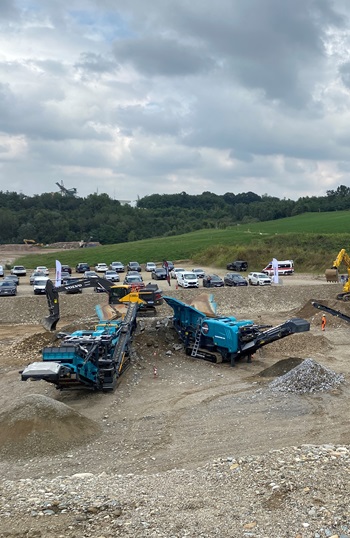
“For some rental customers, our sales guys set the machine up and show how to run it. Then, they go back once or twice a week to check how the machine runs. This generally keeps any potential damage down.
“Other rental customers order new machines every year, sometimes twice yearly. They can set up the machines and start using them before our salespeople return the following week to check their progress.
“A lot of our sales come from what were originally rental customers. A customer may rent a machine for a month and then pick up another job, then another. Buying the machine outright becomes a no-brainer, so we work out a finance agreement with the customer and do a deal.”
Darren ‘Barney’ Smith says the financial returns on renting out Lincom Group’s strong rental machine fleet can be good. Echoing Williamson’s observation, Smith says successful rental agreements over several months often lead to new machine sales.
The dealers’ take on the crushing and screening rental business concluded the just over 30-minute panel discussion. Dealers' vital work was further recognised during the Powerscreen World Dealer Conference, with several longtime successful Powerscreen dealers rewarded for their exceptional work during a special awards evening.
Italian dealer Impianti Industriali scooped the coveted Global Dealer of the Year Award.
The evening also saw the introduction of the new Pat Mallon Service Award – honouring former Powerscreen team member Pat Mallon, who sadly passed away in 2021.
The full list of award winners: Best Global Newcomer – Agder Gruppen; Global Leader in Marketing – Blue Group; Global Leader in Training Engagement – Powerscreen Crushing & Screening; Global Leader in Spare Parts Support – Blue Spares; Pat Mallon Service Award – Dirar ‘Shaggy’ Jomar (Powerscreen HQ); Pat Mallon Service Award – Declan McGlinchey (Powerscreen of Florida); Powerscreen Regional Dealer of the Year, Australia & Asia – Lincom Group; Powerscreen Regional Dealer of the Year, Middle East & Africa – Abdul Latif Jameel; Powerscreen Regional Dealer of the Year, South America – Komatsu-Mitsui; Powerscreen Regional Dealer of the Year, Europe – Impianti Industriali; Powerscreen Regional Dealer of the Year, North America – Powerscreen Crushing & Screening; Powerscreen Global Dealer of the Year – Impianti Industriali


